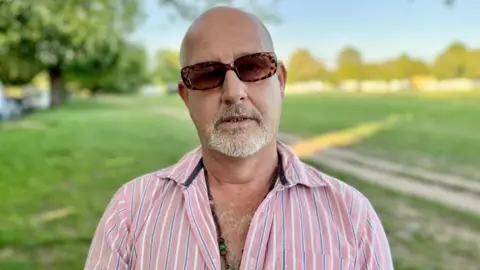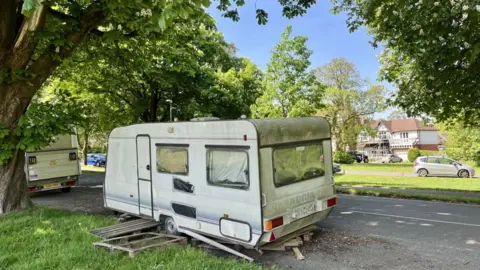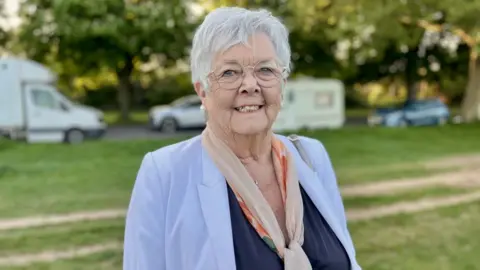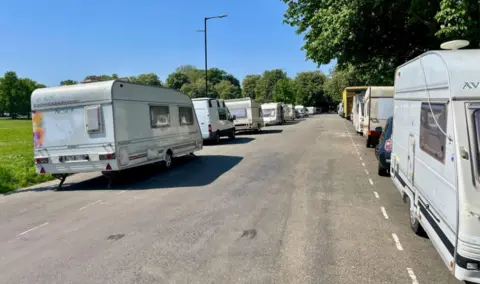Fear and loathing over van dwellers on Bristol’s leafy streets
5 hours agoDan JohnsonBBC NewsReporting fromBristol
“I’m standing up for my rights,” bellows Danny, a balding man with a grey beard who calls a converted horsebox home in a leafy suburb of Bristol.
The 55-year-old has just marched across the grass, his pink shirt flapping open in the early evening warmth, to confront group of locals who have gathered near their homes, next to a row of decaying caravans.
“You shouldn’t be on the Downs,” a historic open parkland in the city, one of the women says, accusing him of having “attitude”.
“Why shouldn’t I?” he shoots back. “What’s it got to do with you?”
The frayed tempers we witnessed in the city’s Clifton suburb this week were a vivid sign that the temperature here is rising.


More than 100 caravans have appeared on the edge of the green space, parked up and showing no sign of budging, most of them in the last few months.
This has angered some residents, who have complained about rubbish, human waste, anti-social behaviour and the blocking of streets and views. They question why van dwellers, as they’re known, are allowed to stay for weeks, months, even years, filling up roads where parking is normally limited to five hours.
The residents want action; the van dwellers want empathy.
At the heart of it all is a clash of cultures playing out on Bristol’s picturesque streets. Soaring house prices and rising rents make this one of the most expensive cities and have brought increasing tension to its neighbourhoods.
‘Become a sink’


“The stuff they are posting is absolutely ludicrous, in fact it’s bordering on hate crime,” Danny, who won’t give his surname, tells me. He’s referring to the “Protect the Downs” group on Facebook that has been set up calling for vans to be removed from the area.
Accusing the locals of acting like a “lynch mob”, he defends his contribution to the city through arts and events companies he’s run and says he paid £35,000 in business rates to Bristol City Council last year.
But Tony Nelson, a former RAF serviceman who runs the Facebook group, denies any charge of elitism or Nimbyism. “The few responsible van dwellers are fine, they’ve never been a problem.”
That’s not the case for all, he says. Earlier this year a caravan burned down in a suspected arson attack. Locals have also reported alleged drug use, potential human trafficking and prostitution, and claim a minority of the dwellers empty toilet waste into drains, gardens and bushes.
Denying that his group is targeting van dwellers, Tony says they are in fact “trying to find the people who are truly vulnerable so we can get them the help they need”.
“This used to be famous across the country – I’d heard of the Bristol Downs when I was living in East Anglia, so I know it was once a treasured place,” Tony tells me.
“Now it’s become a sink.”
The situation has reached a point where Anne Bragg, who moved six years ago to a home overlooking the Downs, says she and her fellow residents are afraid to leave their retirement flats at night.
“I have a great deal of sympathy for people who are homeless, I really do. But there are a lot of people up here who are not – they’re just living here because they can. I have to pay for the privilege,” she says, referring to the lack of council tax paid by the dwellers – though some may still pay road taxes or income taxes.


No easy solution
And it’s not just the Downs. Across the city there are an estimated 680 vans or caravans being used as homes. Numbers have increased from 150 before the pandemic and surged particularly in the last two years. Bristol has the highest figures, and is the first city to come up with a suggested permanent solution – dedicated sites for van dwelling, plus “service sites” like pit stops for water and waste, and more outreach services to help people get a home if they want to.
But currently there is neither the money nor the space allocated for this, with a small number of temporary sites in the meantime proving unable to keep up with demand.
“It’s incredibly difficult,” says Ian Bowen from Bristol City Council, who has co-ordinated its Gypsy, Roma and Traveller Service since 2020 and spends most of his time focused on van dwellers.


He says the council needs to do more to address the city’s “crisis of accommodation”, leaving people shut out of the housing market through poverty, addiction or poor mental health, but it’s another set of costs for a cash-strapped public service. Issuing fines against unregistered caravans is tricky, evicting them is expensive and, Ian says, futile.
“We don’t want to just move people from one place to the next. We need to provide people with a different opportunity so they’re not having to live in old, unhygienic vehicles. They are Bristolians who are trying to live and work in the city they call home, and they need to be treated as citizens, the same as anyone else.”
Another aspect to all this is that the van dwelling community is itself divided over moving on to different, or more permanent, locations.
‘They will never get rid of us’
Sandwiched between Bristol’s Ikea store and the rumbling M32 motorway, Ash Waker gives a guided tour of his twin berth. “It’s not big but it’s home,” says the 30-year-old who’s lived here for three years, drifting in and out of work as a chef. A massive “Home Furnishings” banner glares over the line of grubby once-white caravans, many with padlocked doors and windows taped shut.
Ash explains that an immigration enforcement team last year removed his Brazilian kerbside neighbours who had been working as delivery riders, leaving abandoned caravans which were taken over by drug dealers and alcoholics.
“I’d happily move onto a site,” he says. “If it keeps the peace and we can live how we want to live then I’ll happily pay for it.”
But Danny is defiant. “They will never get rid of us,” he says. “They can do whatever they like, but people have lived on that road for years and years, 30 or 40 years.”
He adds that he feels some of the local residents complaining about the van dwellers are bigoted and small-minded.
Social divisions are on show here and questions are being posed about whose rights should rule over our shared spaces. People live in vans for many different reasons, some making a choice, others facing a life of limited options.
In the fiery confrontation we witnessed on the Downs, the two sides felt very far apart, wary of each other’s motives and intentions. But as tempers calmed, Danny and Tony shook hands.
“We all agree it’s the council’s inaction that is letting everybody down,” Tony says, finding something they agree on. All accept the situation is untenable and other places will be watching how Bristol finds a resolution that offers a home to suit everyone.
More on this storyBristol